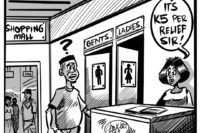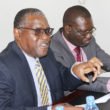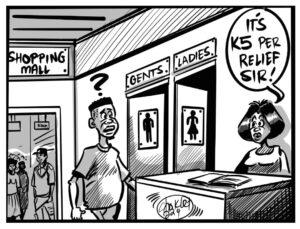Centre for Trade Policy and Development (CTPD) board chairperson Trevor Simumba has urged Zambians to advocate for the citizens’ arrest legislation to allow private individuals or organizations prosecute suspected criminals of illicit financial flows.
Commenting on revelations from the Financial Intelligence Centre (FIC) that Zambia lost an estimated K4.5 billion in financial crimes in 2017 alone, Simumba said Zambians should not wait for President Edgar Lungu to fight corruption because it was obvious that he had no intention of taking any action against the vice.
“This is taxpayers’ money that is being wasted, so I think it’s important that we take a stand. The media will also be critical in helping us conduct investigations and bring out these issues. All of us, as citizens, need to play a role, it’s important. We can’t just sit and wait for the President because it obviously looks like the President is not going to take action. So, the FIC has brought out these issues, we can pick one or two cases, go though the whole process with them, and see where it goes. At least let’s put the DPP, ACC and all these institutions that are supposed to do their job. Let’s put them on notice so that they are embarrassed to be able to take action. Because there are some clear cases in that document (FIC report) that show that there was corruption and you can trace how the money moved and what happened,” Simumba told News Diggers! in an interview, Friday.
And Simumba, the renowned trade expert and international development consultant with over 16 years of experience in trade and investment in developing countries, called for the introduction of a “Citizen’s Prosecution” law to be introduced to arrest the rampant theft of funds by public officers.
A private prosecution is a criminal proceeding initiated by an individual or private organization, such as a civil society organization (CSO), instead of by a public prosecutor who represents the state.
Private prosecutions are allowed in many jurisdictions under common law.
“Yes [we need the Citizen’s Prosecution law] and we would need the guidance of the Law Association of Zambia (LAZ), but I asked a question directly during a meeting with FIC [on Thursday] and the Attorney General did confirm that it is possible under Zambian laws. Of course, you still have to get permission from the DPP but I think it’s important that as citizens we take it up, as civil society, business associations, including the law association. So, a number of us, as CSOs, and other citizens, are looking at this very seriously and most likely we will announce a meeting with the Law Association of Zambia to really go through this. We need the help of lawyers; we also need the help of retired Anti-Corruption Commission (ACC) investigators and retired police investigators. This can be done, even if it takes time, what is important is that we must begin as citizens to take responsibility because this kind of money being lost to corruption is not acceptable,” Simumba insisted.
He feared that the FIC would get discouraged to produce the crucial reports every time if no action is ever taken against the perpetrators of financial crimes.
He, however, urged the Centre to forge ahead.
“Of course, FIC would be discouraged, but that’s their job, their job is to act to stop illicit financial flows. The issue is that we cannot just sit back, we have got the right as citizens, to conduct the private investigation and push for a private prosecution. The point is this: if the DPP stands in our way, it would now expose the government that they don’t want to accept even where there are obvious cases of corruption. So, it will prove the point and then we will have every right as citizens, come the next election to go to the people and say, ‘do you want to continue to elect people who are thieves and don’t care?’ So, we will have the position, but if we don’t try, we will never know, so we will have to push as much as we can because it’s within our right as citizens. We also have to involve Parliament and all these bodies, we must now put them to work, they must work,” Simumba demanded.
He further explained the devastating impact of theft of national resources on the general economy.
“Such kind of theft affects the economy severely, because what happens is that the cost of government operations increases. For example, if government is building a road at $100 million, but then because of corruption, government ends up using $200 million dollars, it has an effect. It means that taxes will have to be increased in order to cover those problems; the road, maybe, would not even be built according to standard so within a few years, it will deteriorate and we will have to look for more money again to do the same road. So, it has a major effect on the society, it means that money, which should have gone to other areas like buying medicine, for example, is not going to buy medicine but to fill people’s pockets,” he lamented.
“So, it has a major impact, it’s not something that we should accept as part of life. Some of these problems we are seeing in the economy in terms of debt contraction by the government is arising from a lot of this corruption. This is K4.5 billion in one year. So, that means that kind of money has gone out of our economy, and if you notice in the FIC report, most of the money that these people are getting, they are taking it out of the country; they are buying properties outside Zambia; they are establishing businesses outside Zambia. So what are the benefits to the country? There is nothing.”
He also appealed to the Zambian citizenry in general and other stakeholders to join hands and formulate a plan of action on how to deal with issues of corruption in the country.
“I have already spoken to the current President of LAZ, and he’s willing to sit down with us. My appeal is to all the civil society organizations. Professional bodies like Zambia Institute of Chartered Accountancy, Bankers Association of Zambia, Economists Association of Zambia, Engineers, Academia… let’s come together as Zambian citizens and formulate a plan of action on how to deal with this corruption. The University of Zambia School of Engineering recently did a very good study on corruption in the construction sector, we are spending a lot of money in the construction sector, but there is huge corruption there. We should also appeal to the Anti-Corruption Commission, the Zambia Police and others, please let’s work together. If you are having difficulties, tell us what it is, maybe we can help as independent citizens. So, we need to come together, and very soon through the Centre for Trade Policy and Development and other NGOs, we are going to call for a meeting to discuss this matter,” said Simumba.












